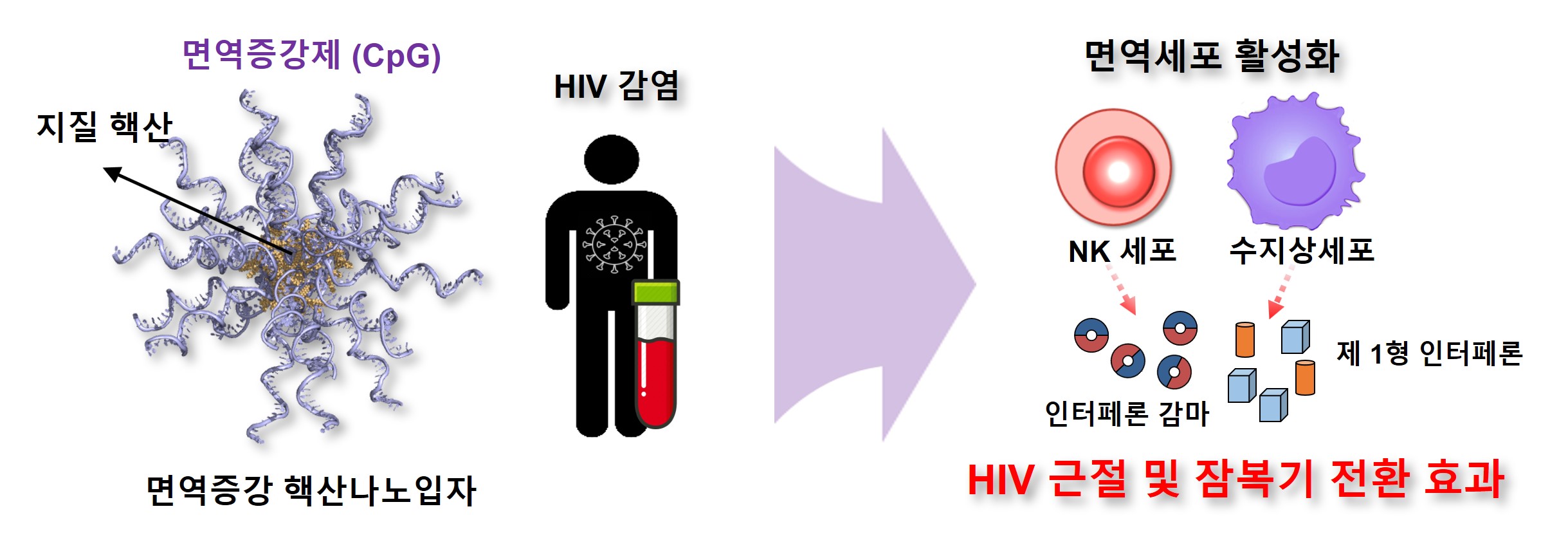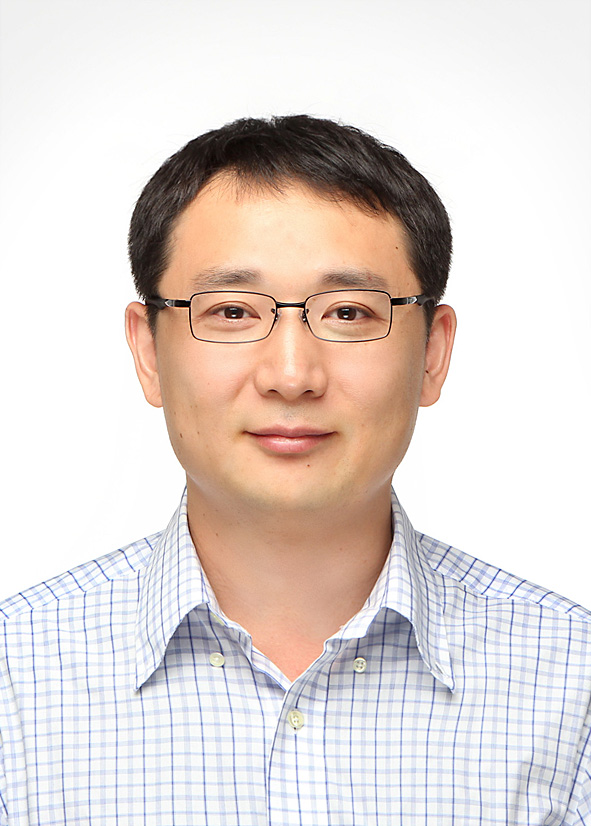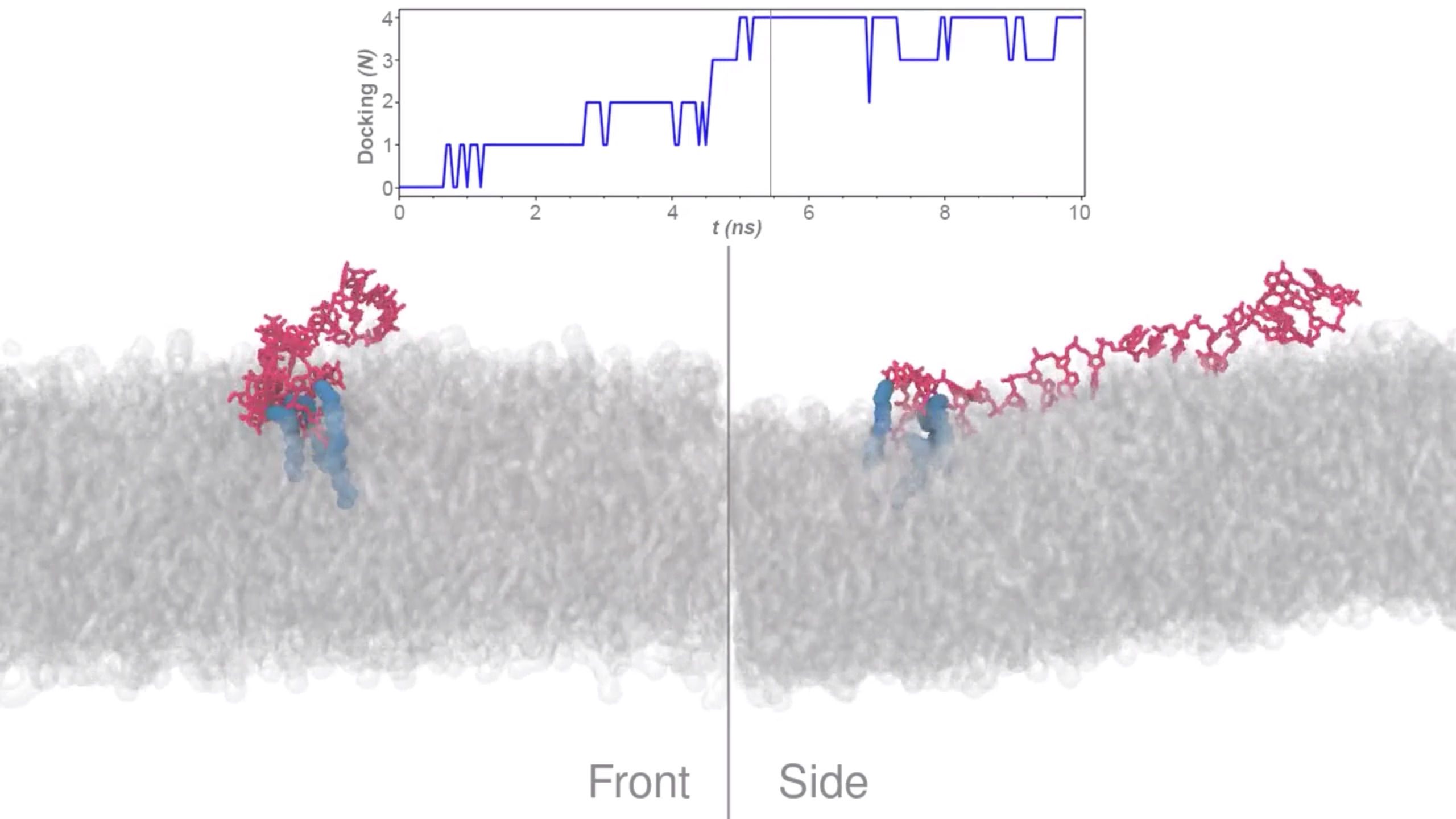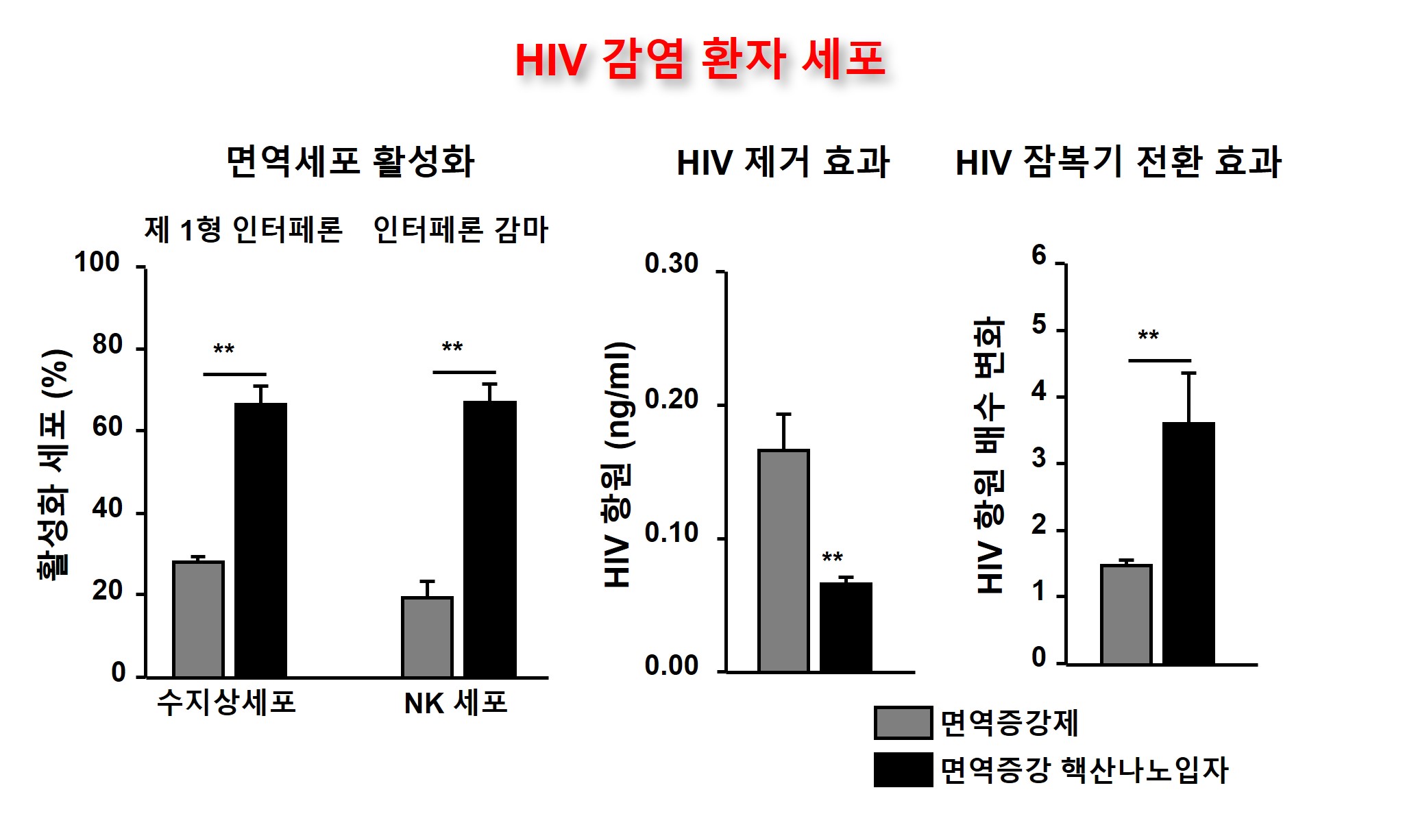커뮤니티
부경투데이
- 국립 부경대학교의 다양한 모습과 소식을 접하시면 부경대학교가 한번 더 가까워집니다.
| HIV 치료법 개발 '주목' (A notable achievement for a development of HIV treatment) | |||
| 작성자 | 대외협력과 | 작성일 | 2021-09-19 |
| 조회수 | 601 | ||
| HIV 치료법 개발 '주목' (A notable achievement for a development of HIV treatment) | |||||
 |
대외협력과 |  |
2021-09-19 |  |
601 |
HIV 치료, 바이러스 억제 넘어 ‘제거’ 방법 찾았다
- 부경대 곽민석·영남대 진준오 교수팀 성과 … 코로나바이러스에도 활용 가능

△ 면역증강 핵산나노입자의 HIV 대항 면역활성 전략 모식도.
인체면역결핍바이러스(HIV) 치료를 위해 바이러스를 억제하는 현재의 치료법을 넘어 바이러스를 제거할 수 있다는 연구결과가 나와 주목받고 있다.
 한국연구재단은 부경대학교 곽민석 교수(화학과)와 영남대학교 진준오 교수(의생명공학과) 연구팀이 면역활성 유도 핵산나노입자를 개발했다고 밝혔다.
한국연구재단은 부경대학교 곽민석 교수(화학과)와 영남대학교 진준오 교수(의생명공학과) 연구팀이 면역활성 유도 핵산나노입자를 개발했다고 밝혔다.
HIV 감염환자의 면역세포가 외부 침입물로 인식할 합성 핵산분자를 제작해 면역세포를 활성화하고 감염된 세포를 제거하는 것이 연구의 핵심이다.
HIV에 감염되면 면역체계가 손상돼 병원균 침입에 취약해지기 때문에 바이러스를 제거해 손상된 면역체계를 회복하는 것이 가장 중요하지만, 현재의 항바이러스 치료법은 바이러스를 억제하고 면역기능을 회복 유지하는 데 그치는 한계가 있다.
연구팀은 구(球)형으로 자가조립 될 수 있는 지질핵산염기에 면역증강 서열이 결합된 지질 DNA 분자들이 뭉치는 원리로 직경 약 14nm(나노미터·10억분의 1미터)의 면역증강 핵산나노입자를 설계, 합성했다.
이 핵산나노입자는 면역세포를 자극하는 CpG 염기서열을 가진 핵산에 인공 지질구조를 더해 설계돼 지질이중막 구조의 세포막을 효과적으로 통과할 수 있는 것은 물론, 자가조립 성질을 가져 약물 전달체가 필요 없는데다 여러 지질 핵산이 구형으로 응집한 작은 나노구조로 균일하게 만들어진 것이 특징이다.
연구팀은 HIV 감염 환자의 혈액을 이용한 실험을 통해 이 핵산나노입자의 면역세포 활성화 능력과 항바이러스 효과를 확인했다. 핵산나노입자가 환자 혈액에 있는 백혈구의 활성을 유도하고, 바이러스에 대항하는 특화된 수지상세포를 자극해 바이러스와 싸울 수 있는 사이토카인 단백질을 대량으로 분비시키는 것으로 나타났다.
부경대 곽민석 교수는 “이번에 개발한 핵산나노입자는 바이러스 치료를 위한 다양한 면역활성을 유도하는 것으로 확인돼 HIV뿐만 아니라 코로나바이러스에도 효과적인 치료제로 활용할 수 있을 것으로 기대한다.”라고 밝혔다.
한편 이번 연구는 과학기술정보통신부와 한국연구재단이 추진하는 중견연구지원사업 등의 지원으로 수행됐으며, 바이오 소재 분야 국제학술지 <바이오머티리얼스(Biomaterials)>에 8월 27일 게재(온라인)됐다. <부경투데이>

△ 지질 DNA 면역활성 분자의 세포막 상호작용 분자 동역학 연구.

△ 핵산나노입자의 면역세포 활성화 및 HIV 제거와 잠복기 전환 효과.
HIV treatment, found a way to eliminate the virus beyond suppressing
- The results of the team of PKNU Prof. Kwak Min-Seok & Yeungnam University Prof. Jin Jun-O … can also be used for coronavirus
For the treatment of human immunodeficiency virus (HIV), research results showing that the virus can be removed beyond the existing treatment that suppresses the virus is drawing attention from the public.
The National Research Foundation of Korea (NRF) announced that a research team led by Professor Kwak Min-Seok (Department of Chemistry) of Pukyong National University and Professor Jin Jun-O (Department of Medical Biotechnology) of Yeungnam University has developed nucleic acid nanoparticles that induce immune activity.
The core of the research is to activate the immune cells and remove the infected cells by making synthetic nucleic acid molecules that the immune cells of HIV-infected patients will recognize as antigen.
When infected with HIV, the immune system gets damaged, making it vulnerable to pathogen entry, so it is most important to remove the virus and restore the damaged immune system. However, current antiviral therapy has limitations in suppressing the virus and restoring and maintaining immune function.
The research team planned and synthesized immune-enhancing nucleic acid nanoparticles with a diameter of about 14 nm (nanometer, one billionth of a meter) based on the principle of aggregation of lipid DNA molecules with immune-enhancing sequences bound to lipid nucleic acid groups that can be self-assembled in a spherical shape.
These nucleic acid nanoparticles can effectively pass through the cell membrane of the lipid bilayer structure by adding an artificial lipid structure to the nucleic acid having the CpG sequence that stimulates immune cells. In addition, since it has self-assembly properties, it does not require a drug carrier and is characterized by uniformly made small nanostructures in which various lipid nucleic acids are aggregated in a spherical shape.
The research team proved the immune cell activation ability and antiviral effect of these nucleic acid nanoparticles through experiments using the blood of HIV-infected patients. As a result, it was shown that the nucleic acid nanoparticles induce the activity of white blood cells in the patient's blood, stimulate the specialized dendritic cells to fight the virus, and secrete a large amount of cytokine protein that can fight the virus.
Professor Kwak Min-Seok of Pukyong National University said, "As the nucleic acid nanoparticles developed this time have been confirmed to induce various immune activities for virus treatment, we expect that it can be used as effective treatment for not only HIV but also coronavirus."
The research was conducted with support from the mid-level research support project promoted by the Ministry of Science and ICT and the National Research Foundation of Korea, and was published (online) on August 27th in <Biomaterials>, which is an international academic journal of biomaterials. <Pukyong Today>